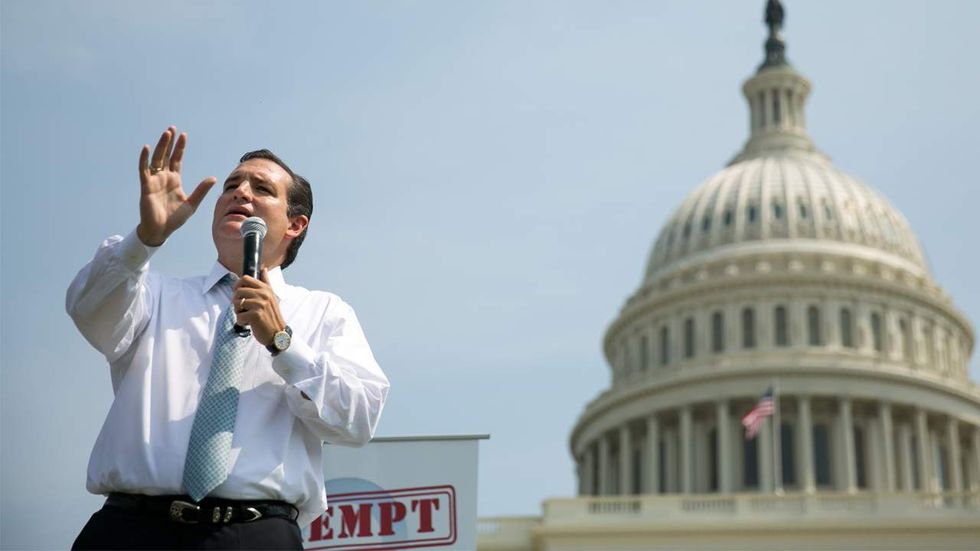A proposed amendment offered in June by Sen. Ted Cruz (R-Texas) to the Senate leadership’s plan to replace the Affordable Care Act is gaining traction as a possible solution that could be enough to elicit the support of both Senate conservatives and moderates concerned about various provisions in the legislation.
Cruz’s amendment to the bill, titled the Better Care Reconciliation Act, would allow health insurers across the country to have significant flexibility in offering health insurance plans so long as they offer at least one plan that complies with the Obamacare mandates now in place, according to a report by Business Insider.
Under the ACA, health insurers providing plans in the health insurance exchange must provide coverage for a number of “essential health benefits” many conservatives say unnecessarily drive up the cost of health insurance. Insurers are also required to adhere to community-health-ratings standards, which effectively force insurers to charge those being insured the same amount of money regardless of health condition. CHR requirements, coupled with the ACA’s pre-existing conditions requirement, have significantly driven up the cost of health insurance, as health insurers have looked to offset the added costs associated with covering people with expensive pre-existing conditions with rising premiums and deductibles.
Cruz’s amendment would let insurers escape these mandates for most of their policies so long as they continue to offer a plan that still adheres to them. This would allow people with pre-existing conditions to continue purchasing insurance at a reduced price (relative to what they would otherwise have to pay), but it would also free up insurers to offer much-cheaper options for those people who are relatively healthy, especially younger people, who have been forced under Obamacare to pay increasingly higher health insurance prices.
The plan is being viewed by many as a potential win for virtually all wings of the Republican Party. Moderates might be willing to agree to the BCRA because they know sicker, costlier patients will still have access to Obamacare provisions. Conservatives could be comforted by the flexibility given to insurers in the bill, which should help make health insurance plans significantly cheaper for millions of Americans.
However, there is one gigantic catch to this seemingly win-win proposal: If insurers have to continue subsidizing patients with substantial health problems who haven’t been paying into the system and healthier consumers are given access to a wide array of cheaper health care options, who is going to cover the insurance companies’ added costs under such a model? According to Cruz, taxpayers.
Cruz explained to a writer at Vox.com, “If those with seriously [sic] illnesses are going to be subsidized, and there is widespread agreement in Congress that they are going to be subsidized, I think far better for that to happen from direct tax revenue rather than forcing a bunch of other people to pay much higher premiums.”
Cruz’s plan to subsidize health insurance companies’ losses with federal tax dollars is quite a step back from the conservative senator’s usual stance on the role of government, leading many conservatives to criticize the plan as an assurance of greater federal involvement in health care for years to come.
Conservative website HotAir.com said of Cruz’s plan, “Man, we’re a long way from the tea party’s salad days. … The point of Cruz’s amendment is to give people more options in coverage. But the right wing of the GOP embracing greater federal subsidies for the very sick does feel like a significant step ideologically towards single-payer eventually. Relatedly, if the feds are going to be picking up (much of) the tab for people with preexisting conditions, those ObamaCare taxes suddenly become much harder to get rid of.”
Left-wing critics of the proposed amendment to the bill — many of whom want to save Obamacare or expand it — say it won’t help America’s sickest patients, who will end up becoming the only group interested in purchasing the Obamacare-compliant insurance plans, forcing prices up for them while healthier people are able to purchase cheaper plans.
Lost in the debate is that under every version of the Senate’s bill, states would have the power to pay for additional programs of their own, including programs that could provide extensive subsidies to people with pre-existing conditions, an important reality that seldom gets discussed in Washington discussions about reforming health care.



